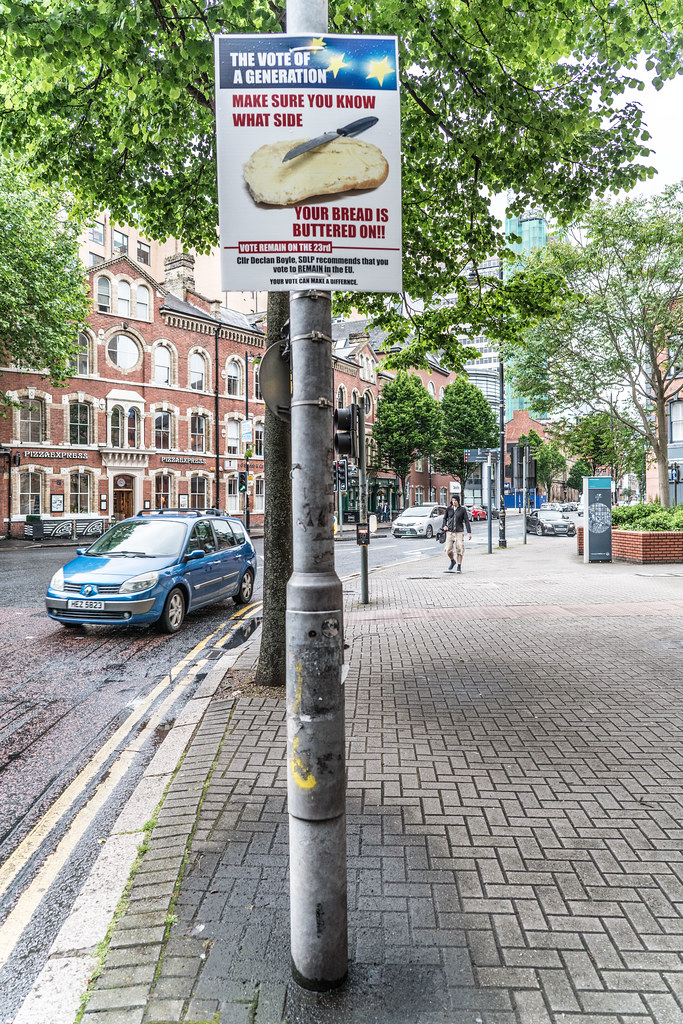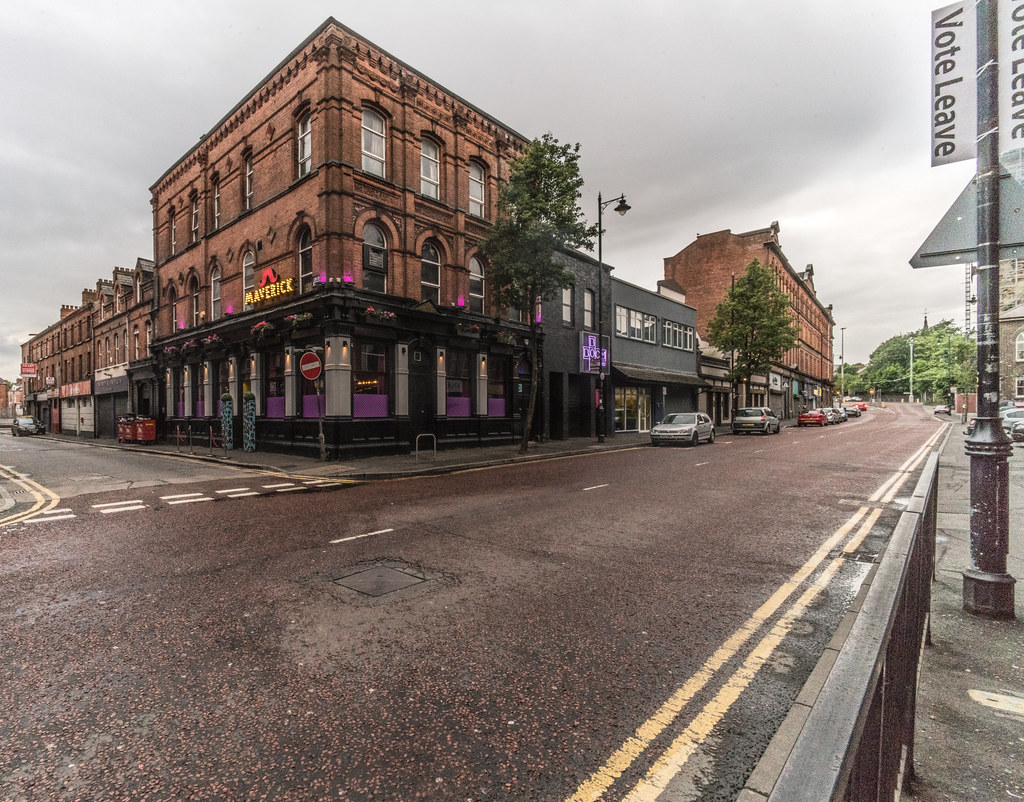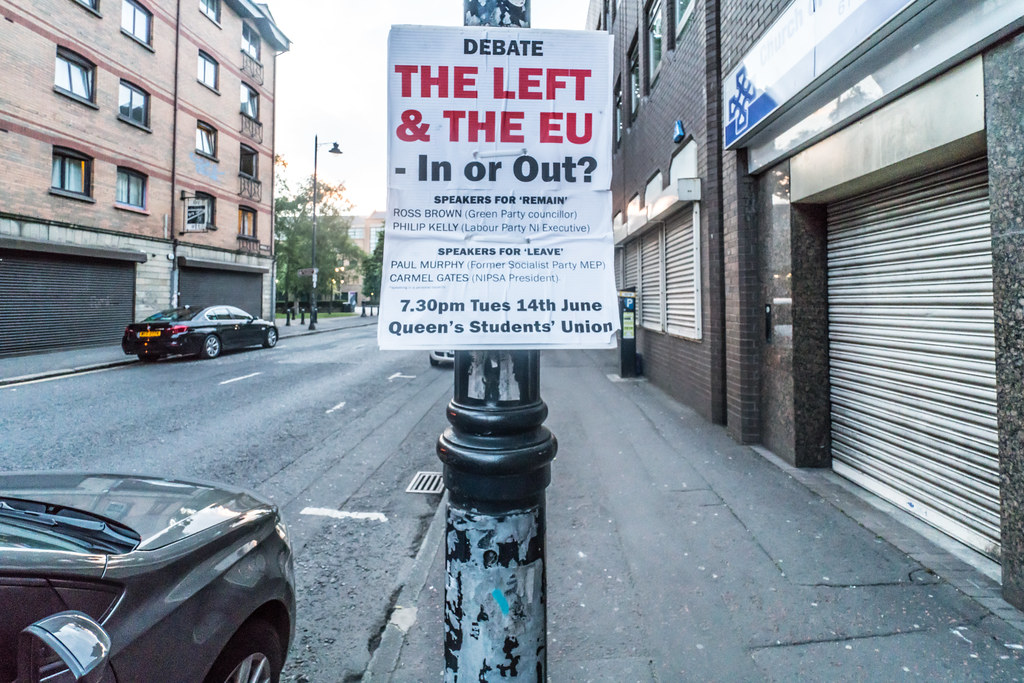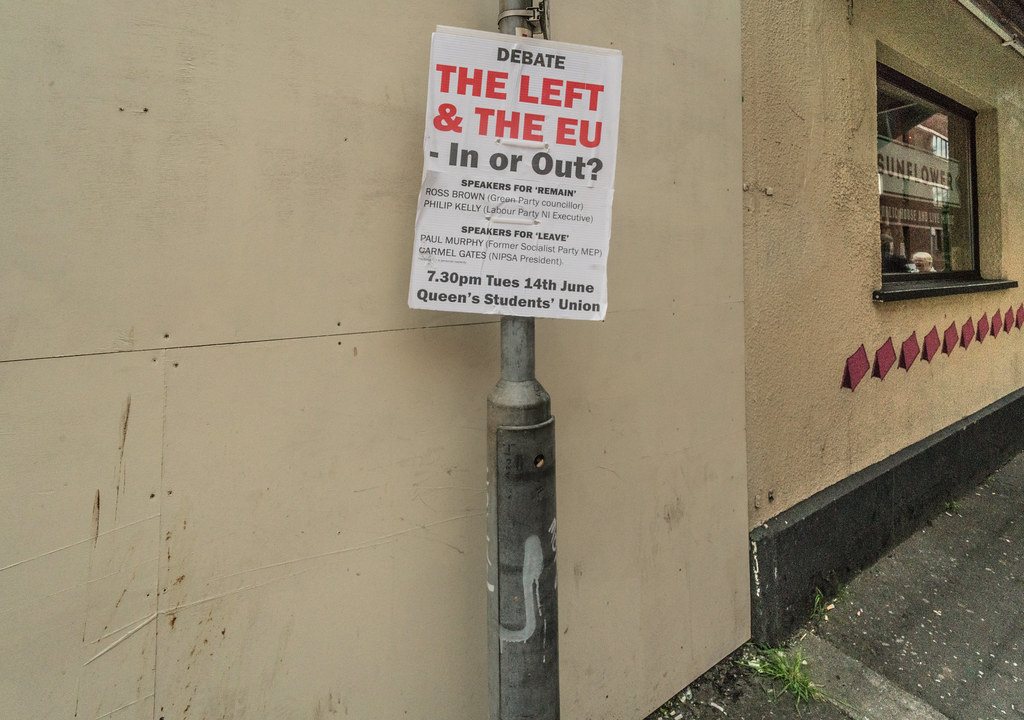
Custom Search
THE GREEN MENU OPTIONS ARE MOBILE FRIENDLY AND ARE FASTER SO THEY ARE RECOMMENDED. THE RED MENU OPTIONS ARE SOMEWHAT SLOWER DEPENDING ON YOUR DEVICE OR BROWSER AND ARE MORE SUITABLE FOR DESKTOPS AND LAPTOPS. THE BLUE OPTIONS ARE PAGE LINKS AND WILL BE PHASED OUT GOING FORWARD
THE BREXIT CAMPAIGN IN BELFAST
I decided to visit Belfast a week before the Brexit referendum in order to photograph political posters and maybe get some opinions. I was surprised by the lack of posters and by the number of younger people who said that they were not planning to vote. Older people appeared to be in favour of Brexit … it is not easy to query people in Belfast so my sample was too small to reach any real conclusion about the outcome but I was beginning to believe that the decision would be to leave the EU. Today the 23rd June I believe that they decide to remain.
While photographing at City Hall I was approached by an older gentleman who wanted to know whi I was photographing war memorials as they were a “Load Of Sh**e”. He then went on to explain that he was going to vote in favour of Brexit in order to stop thousands of gays,muslims and blacks coming in from the Republic Of Ireland … at this stage I was really confused. I then asked if he thought that the Brexit side would win and much to my surprise he said “NO, the the whole processed is rigged by the people in Brussels”.
While photographing at City Hall I was approached by an older gentleman who wanted to know whi I was photographing war memorials as they were a “Load Of Sh**e”. He then went on to explain that he was going to vote in favour of Brexit in order to stop thousands of gays,muslims and blacks coming in from the Republic Of Ireland … at this stage I was really confused. I then asked if he thought that the Brexit side would win and much to my surprise he said “NO, the the whole processed is rigged by the people in Brussels”.
SORRY FOR THE DELAY
The United Kingdom European Union membership referendum, known as the EU referendum in the United Kingdom, is a plebiscite taking place on 23 June 2016. Membership of the European Union has been a topic of debate in the United Kingdom since the country joined the European Economic Community (EEC, or "Common Market") in 1973.
In accordance with a Conservative Party manifesto commitment, the legal basis for a referendum was established by the UK Parliament through the European Union Referendum Act 2015. It will be the second time the British electorate has been asked to vote on the issue of Britain's membership: the first referendum was held in 1975, when continued membership was approved by 67% of voters.
Those who favour a British withdrawal from the European Union – commonly referred to as a Brexit (a portmanteau of "British" and "exit") – argue that the EU has a democratic deficit and that being a member undermines national sovereignty, while those who favour membership argue that in a world with many supranational organisations any loss of sovereignty is compensated by the benefits of EU membership.
Those who want to leave the EU argue that it would: allow the UK to better control immigration, thus reducing pressure on public services, housing and jobs; save billions in EU membership fees; allow the UK to make its own trade deals; and free the UK from EU regulations and bureaucracy that they see as needless and costly.
Those who want to remain argue that leaving the EU would: risk the UK's prosperity; diminish its influence over world affairs; jeopardise national security by reducing access to common European criminal databases; and result in trade barriers between the UK and the EU. In particular, they argue that it would lead to job losses, delays in investment into the UK and risks to business.
Britain Stronger in Europe is the main group campaigning for the UK to remain in the EU, and Vote Leave the main group campaigning for it to leave. Many other campaign groups, political parties, businesses, trade unions, newspapers and prominent individuals are also involved.
In accordance with a Conservative Party manifesto commitment, the legal basis for a referendum was established by the UK Parliament through the European Union Referendum Act 2015. It will be the second time the British electorate has been asked to vote on the issue of Britain's membership: the first referendum was held in 1975, when continued membership was approved by 67% of voters.
Those who favour a British withdrawal from the European Union – commonly referred to as a Brexit (a portmanteau of "British" and "exit") – argue that the EU has a democratic deficit and that being a member undermines national sovereignty, while those who favour membership argue that in a world with many supranational organisations any loss of sovereignty is compensated by the benefits of EU membership.
Those who want to leave the EU argue that it would: allow the UK to better control immigration, thus reducing pressure on public services, housing and jobs; save billions in EU membership fees; allow the UK to make its own trade deals; and free the UK from EU regulations and bureaucracy that they see as needless and costly.
Those who want to remain argue that leaving the EU would: risk the UK's prosperity; diminish its influence over world affairs; jeopardise national security by reducing access to common European criminal databases; and result in trade barriers between the UK and the EU. In particular, they argue that it would lead to job losses, delays in investment into the UK and risks to business.
Britain Stronger in Europe is the main group campaigning for the UK to remain in the EU, and Vote Leave the main group campaigning for it to leave. Many other campaign groups, political parties, businesses, trade unions, newspapers and prominent individuals are also involved.



